Video on how to parallel park in a tight gap.
Subscribe for more tips on our YouTube channel
We're going to have a look at how to parallel park in a tight gap.
Choose a suitable space.
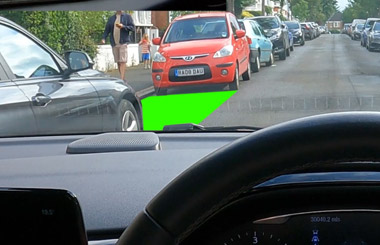
1. Make sure that the space you want to reverse into is big enough. Of course, you can't drive in sideways so the space needs to be at least about 1 and a half car lengths.
Tip: Before you begin to reverse park, move the left hand mirror down so that you see the kerb. Just make sure that you don't stare the mirror when you're reversing or although you might not hit the kerb, you might crash into something else or even hit someone crossing the road behind you.
Don't forget to readjust the mirror once you've finished parking.
Tip: Before you begin to reverse park, move the left hand mirror down so that you see the kerb. Just make sure that you don't stare the mirror when you're reversing or although you might not hit the kerb, you might crash into something else or even hit someone crossing the road behind you.
Don't forget to readjust the mirror once you've finished parking.
|
|
|
|
|
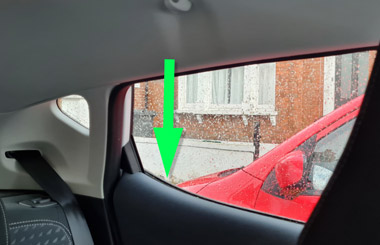
2. As the road is so narrow I need to start reasonably close to the red car because when I steer left into the space, the front of my car will swing out towards the car on the right.
Select reverse to get the white reverse lights on behind. This shows anyone behind what I'm doing.
3. Check all around to make sure it's safe and then reverse until the very front or rear of the other car is in your back left window. All reference points shown might not work for you and may look slightly different as they vary depending on the size of your car, seat position and height but they will be similar.
Select reverse to get the white reverse lights on behind. This shows anyone behind what I'm doing.
3. Check all around to make sure it's safe and then reverse until the very front or rear of the other car is in your back left window. All reference points shown might not work for you and may look slightly different as they vary depending on the size of your car, seat position and height but they will be similar.
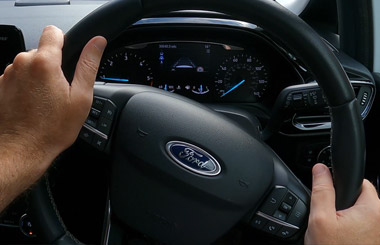
4. I need to get the back of the car in to the left so I'll steer one whole turn to the left. Not maximum turns just one whole turn.
Keep observing around over your left and right shoulder.
Keep observing around over your left and right shoulder.
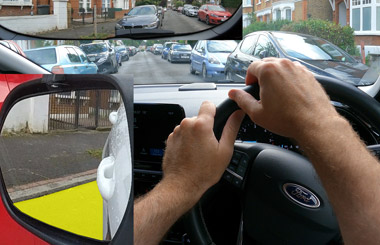
5. I can see in the mirror that the back of the car is quite close to the kerb. This is when I need to steer two whole turns to the right with the car hardly moving.
To help you remember this point. Imagine the parked cars are at a 12 o clock angle then I'm pointing at about a half past 1 angle. I can also see this triangle of road in the mirror.
The front swings in towards the kerb when you steer right so make sure it doesn't hit the vehicle in front.
Be ready to steer more to the right if it looks like you're going to hit the kerb or more left if it's going too wide.
Keep a look out for other people.
To help you remember this point. Imagine the parked cars are at a 12 o clock angle then I'm pointing at about a half past 1 angle. I can also see this triangle of road in the mirror.
The front swings in towards the kerb when you steer right so make sure it doesn't hit the vehicle in front.
Be ready to steer more to the right if it looks like you're going to hit the kerb or more left if it's going too wide.
Keep a look out for other people.
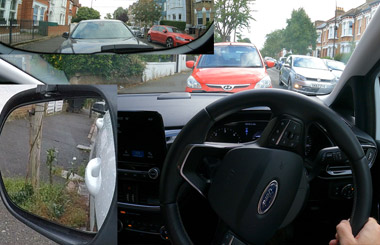
6. The front of my car is out slightly compared to the car in front and I need to leave space for the driver behind to maneuver out so I'll make sure it's safe, pull forward slowly and steer left to get the front in a little.
I had to steer a lot as I've got limited space.
Once it looks level with the car in front straighten the steering back to the right.
Once it looks level with the car in front straighten the steering back to the right.
Video on how to parallel park on a hill.
